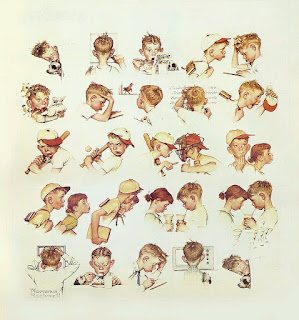What a world we live in… all the information we could ever
want at our finger tips. Every day more and more is uploaded onto the internet.
Some of it is way more then we want to know, other bits are just not
interesting and some of it well some of it we spend hours and hours looking at
studying and following the mystical trail that seems to lead nowhere. Oh and
the latter is usually us looking up something we meant to and we ended up watching
cat and music videos only to realized we just spent 6 hours not researching
what we meant to do.
Oh I spend plenty of time looking up what I want to but can
I also say it is really hard when either the source I am looking for has not
been uploaded yet, destroyed by time, destroyed by war, destroyed by vandals,
in a language I can’t read, or my favorite it was never talked about in the
first place. The thought that any history has been lost to time has always been
sad, the idea that it was damaged by vandals, war or people who just don’t care
is painful but the idea that they never wrote about it is frustrating.
Here is the thing, I want you to look at your own life,
think about what you have written about, read about, and talked about in just
the last year. Now I want you to think about if you could meet me what would
you tell me about your life. Now it would probably the highlights, the craziest
things you have ever done, the funniest thing that ever happened to you, the
things that we have in common and whatever new is happening to you. Now think
about what you won’t be telling me about, a trip to the grocery store, when you
went to the bathroom, and so many other information that you and I both can
assume I know and probably don’t want to talk about. It is the same thing with
history. What we read, what we see and what comes to life are the strange and
new things people have decided to share. It is why history is written by the
Kings, Queens, and the winners.
 |
| Day in the life of a boy by Norman Rockwell |
As historians we are getting better at piecing together
information of the everyday lives of everyday people through out time. How do we
piece together information that is not there? We do experimental archaeology. That
means we try things out and we use logic. When it comes to everyday life we can
start by looking at basic necessities, housing, food, clothing, drink, and
health. Between archaeology and what paintings, books, documents and drawings we
do have we can start to date things. That is where we can begin and then we
just have to use a little common sense and hope more things come to light. I
think just because there is no evidence of something that doesn’t mean that it
isn’t possible if common sense pulls you in that direction. There is written evidence
of places there are no physical evidences of until they are dug up. There is
physical evidence of things that there is no written evidence of. When common sense
says people will use whatever is available to survive so even if there is no
evidence of a shelter we can assume there was some form. We know that people
eat and although there may not always be evidence of food at a dig site, there
is signs of cooking, and signs of what their diet may be by the teeth and
chemicals from bodies found on sites. We know people were wearing clothing and
although that is some of the first things to decompose we automatically know
they dressed
themselves because there is evidence in other cultures. Now we just have to
look at what may have been available to them to explain what they were wearing.
So here is to frustrating history and searching out the
truth.

No comments:
Post a Comment